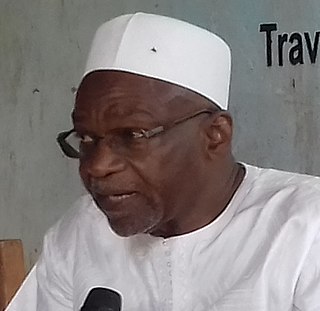Related Research Articles
Telecommunications in Chad include radio, television, fixed and mobile telephones, and the Internet.
Union Nationale may refer to several political parties:
Hervé de Charette is a French centrist politician. He is a descendant of the royalist military leader François de Charette and of king Charles X of France. Member of the Union for French Democracy (UDF), he was elected deputy for the first time in 1986 as representative of the Maine-et-Loire département. During the first cohabitation, from 1986 to 1988, he served as Minister of Civil Service, then, during the second, from 1993 to 1995, as Minister of Housing. In the UDF, he remained faithful to the leader Valéry Giscard d'Estaing. Like him, and contrary to the most part of the UDF politicians, he supported the winning candidacy of Jacques Chirac in the 1995 presidential election and not that of Prime Minister Édouard Balladur. In this, after the campaign, he found and led the Popular Party for French Democracy (PPDF), a component of the UDF, and served as Minister of Foreign Affairs until the defeat of the Presidential Majority in the 1997 legislative election. In 2002, he joined the Union for a Popular Movement. In December 2009, he left this party for the Nouveau Centre.
The National Union for Democracy and Renewal is a political party in Chad led by Saleh Kebzabo. The UNDR is a constituent party of the Coordination of Political Parties for the Defense of the Constitution (CPDC), the main opposition coalition opposed to the rule of former president Idriss Déby.

Chad holds elections on national level for a head of state – the president – and a legislature. The president is elected for a five-year term by the people. The National Assembly has 155 members, elected for a four-year term in 25 single-member constituencies and 34 multi-member constituencies. Chad is a one party dominant state with the Patriotic Salvation Movement in power, although according to the African Union, elections in Chad are generally free and fair. Human Rights Watch, however, has criticized the election process in Chad, arguing that they have problems such as electoral fraud, multiple voting, underage voting, and low voter turnout.

Saleh Kebzabo is a Chadian politician. He is the President of the National Union for Democracy and Renewal (UNDR) and a Deputy in the National Assembly of Chad. He was designated Prime Minister by president Mahamat Déby on 12 October 2022.
The National Democratic and Federal Convention is a political party in Chad. According to IPU Parline, the party won 1 out of 155 seats in the 2002 Chadian parliamentary election. The party leader is Ali Golhor.
The Rally for the Republic – Lingui is a political party of Chad. At the 2002 parliamentary election it won 1 out of 155 seats.
The Rally of Democratic Forces in Chad is a political party in Chad, part of the ruling coalition in 2001.
Wadel Abdelkader Kamougué was a Chadian politician and army officer. Kamougué was a leading figure in the 1975 coup d'état and subsequently held several positions in the Chadian government and legislature. He was Vice President of Chad from 1979 to 1982 and President of the National Assembly from 1997 to 2002. Kamougué was also President of the Union for Renewal and Democracy (URD) political party, and he was appointed as Minister of National Defense in April 2008.

The Chadian Civil War of 2005–2010 began on December 18, 2005. Since its independence from France in 1960, Chad has been swamped by civil wars between the Arab-Muslims of the north and the Sub-Saharan-Christians of the south. As a result, leadership and presidency in Chad drifted back and forth between the Christian southerners and Muslim northerners. When one side was in power, the other side usually started a revolutionary war to counter it.

The Chadian National Union was a radical Muslim political party in Chad.
Jean Alingué Bawoyeu, known in French as the vieux sage, which translates as "wise elder", is a Chadian politician who was Prime Minister of Chad from 1991 to 1992. During the 1970s, he served successively as Ambassador to the United States and France. Later, he was President of the National Assembly in 1990. He served in the government as Minister of Justice from 2008 to 2010 and as Minister of Posts and New Information Technologies from 2010 to 2013.

The National Assembly is the lower house of the Parliament of Chad. Deputies of the National Assembly are elected for a five-year term.

Parliamentary elections were held in Guinea on 30 June 2002 after several postponements, over two years after it was originally scheduled to be held. The result was a victory for President Lansana Conté's Unity and Progress Party, which won 85 of the 114 seats.
The National Union for Independence and Revolution was the ruling party in Chad between 1984 and 1990. It was founded in June 1984 by President Hissène Habré as a successor to his Armed Forces of the North, the insurgent group through which Habré had conquered power in 1982. The party was banned six years later by Idriss Déby when he assumed power by overthrowing Habré in the 1990 coup d'état.

Sidiki Kaba is a Senegalese politician who served as the 15th Prime Minister of Senegal from 6 March 2024 to 3 April 2024.
References
- ↑ "CHAD: Parliamentary Chamber: Assemblée nationale, 2002". archive.ipu.org. Retrieved 2024-08-07.